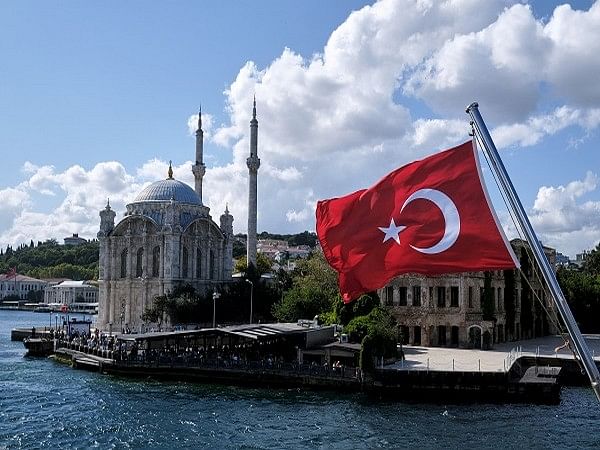Nicosia [Cyprus], March 28 (ANI): As professor Frank G Weber wrote in his famous book about Turkeys Alliance in World War II titled “The Evasive Neutral: Germany, Britain and the Quest for a Turkish Alliance in the Second World War.
“During World War II, Turkey remained neutral, though allied with one side and flirting with the other. Hoping for a combination of safety for herself and expansion at the expense of others, the government dealt carefully with all sides and secured at least some of its objectives.”
Sounds familiar? Isn’t that what the Turkish Government of President Recep Tayyip Erdogan is currently doing in connection with the War in Ukraine?
Turkey has chosen not to apply the Western sanctions imposed on Russia for its invasion of Ukraine, which significantly diminishes the effectiveness of the Western sanctions aimed at exerting pressure on the Kremlin to end its destructive war against the Ukrainian people.
Reprising the role of the “evasive neutral” played by former President Ismet Inonu in World War II, when he chose the victors’ camp only when Hitler was pinned down and neutralized, Erdogan remains on the side-lines, again playing on two tables, on the one hand, as a NATO member and an EU candidate country, and on the other, as a state maintaining strong trade and other relations with Russia.
At the start of the war in Ukraine, Erdogan condemned the Russian invasion as a clear violation of International Law but subsequently toned down his rhetoric so as not to offend Moscow, with which it has close energy, tourism and defense ties.
The autocratic President of Turkey refrained from participating in the sanctions taken by the Western countries against Russia and the oligarch friends of President Vladimir Putin and has even suggested ways of circumventing the sanctions.
On 25 March Erdogan, speaking to journalists, flatly rejected the US suggestion to Ankara to deploy its Russian-made S-400 missiles to Ukraine, describing it as an attempt to “put Turkey in trouble.”
In the past few weeks, the US Deputy Secretary of State Wendy Sherman and other US officials had informally floated the idea that Turkey should think about delivering the S-400 missile defense system it bought from Russia to Ukraine.
It should be noted that the US Administration has requested several countries possessing Russian weapons, including S-300 and S-400, as well as other Russian-made anti-aircraft systems to send them to Ukraine, in order to boost Kyiv’s defenses.
Ankara has been at loggerheads with the United States due to its stern refusal to scrap its S-400 deal with Russia, as the US claimed that they were incompatible with NATO’s weapons, and as Erdogan stubbornly refused to scuttle the deal, US sanctions were imposed on the Turkish Defense sector.
Generally, it was not expected, that after so much acrimony, Erdogan would agree to send those missiles to Ukraine and cause the wrath of Vladimir Putin, who will certainly see it as a hostile action.
Some analysts believe that Ankara, by making clear that it would not impose sanctions on Russian oligarchs, is trying to take advantage of the break between the West and Russia and turn the Ukrainian crisis into an opportunity for Turkey.
Ankara expects to lure some of these oligarchs to purchase assets and make investments in Turkey, which has been facing grave economic problems in the past few years. The Turkish port of Bodrum has become a safe haven for the yachts of oligarchs fleeing the sanctions imposed by Western countries.
For example, billionaire Roman Abramovich, owner of the Chelsea football club and one of the targeted oligarchs, has docked his USD 900 million yacht “Eclipse” and his USD 610 million ” Solaris” superyacht in Bodrum.
On Saturday, Turkish Foreign Minister Mevlut Cavusoglu said Turkey would welcome sanctioned Russian oligarchs, as long as their business dealings are kept in the framework of international law.
Answering a question about Abramovich’s docking his superyachts in Turkey, Cavusoglu replied: “We support only those sanctions that are approved by the UN. If one of the Russians wants to come to Turkey, he can come to Turkey, no problem. If one of the oligarchs wants to do business in Turkey, and if this business is legal and does not contradict international law, then I will consider it.”
Ankara’s policy on this matter is sharply different from that of other countries. For example, a few days ago Italy seized the Euro 530 million yacht of the Russian oligarch Andrey Melnichenko.
Turkey maintains good ties with Ukraine – to which it sold dozens of Bayraktar TB2 drones, used quite effectively in the war, and Russia – which is a major trading partner of Ankara, from which it covers about one-third of its energy supplies, and gets millions of tourists every year.
So, Ankara offered to mediate in the dispute between the two warring nations and earlier this month hosted peace talks in Antalya between the Foreign Ministers of Russia Sergei Lavrov and Ukraine Dmytro Kuleba. The talks did not yield any positive result, but Turkey said it would continue its mediation efforts and that speaking to both sides is an asset.
Yesterday, Ukrainian negotiator David Arakhamia announced that the next round of one-on-one talks between Kyiv and Moscow will take place in Turkey on March 28-30.
Thanks to this development, Erdogan can continue to sit on the fence, posing as an impartial mediator who is offering a useful service to mankind and at the same time, avoid criticism that he is NATO’s odd man, who does not support the Alliance on a major conflict involving invasion of a sovereign country. Turkey under Erdogan is truly an Evasive Neutral. (ANI)
This report is auto-generated from ANI news service. ThePrint holds no responsibility for its content.



